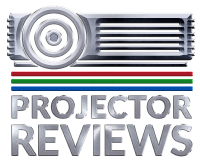The value of the Epson Pro Cinema 4040 is first and foremost, being the least expensive projector at this time that can "play nicely" with 4K content from sources such as a 4K Blu-ray UHD player. I'm not talking some low cost, upscaling 1080 resolution player that can take 1080 content and upscale to 4K. I'm talking reading a 4K disc, processing, and playing it.
The Epson uses a lot of "advanced processing" to make this happen. After all, true 4K is 8 million pixels (aka 8 megapixels). By comparison the Pro Cinema 4040 and other 1080p projectors with pixel shifting, are working with individual pixels 4x the size of true 4K pixels on a true 4K projector. Thanks to pixel shifting, though, the Epson outputs 4 million pieces of information, not the basic 2 million of straight 1080p.

This is our top regular award for projectors. In addition we offer additional awards in our special reports
Fancy processing creates some artifacts. Some of what appears as impressive sharpness and detail, is nothing more than "noise." But, remember, at the end of the conversation, it's what you see on that screen.
Personally, I'm no longer the "purist" I once was, when I would pooh-pooh fancy processing. At this point, I can appreciate that all that processing, despite adding some hardness to the image (noise), definitely gives the impression of a sharper, more detailed image. And that's a noble goal, if not as good as having true extra sharpness and detail.
So, I really like these "pixel shifters" capable of working with 4K content, whether they come from Epson, JVC, or shortly, a host of DLP projectors using pixel shifting and DLP's new 4 megapixel chip. (That's right, native 4 megapixel - double 1080p pixel shifters, and still half of true 4K.

Image (uncalibrated) from Victoria Secret's Swim Suit special, in Bright Cinema mode
Even as the DLPs start shipping, it's extremely unlikely that any of those will be even close to the $2499 price of the PC4040 - especially if adjusting the real cost of the PC4040 to something like $2000 since it includes a spare lamp, cable cover, and ceiling mount. Most of those DLP's have been projected to be $4000 and higher - going past $10,000 for the SIM2, a high end brand. Of course they are natively higher resolution, but still will rely on advanced processing to get them to look as close to true 4K as possible.
I really haven't touched on brightness. Epson rates the Pro Cinema 4040 at 2300 lumens at full power in its brightest mode.
While I didn't do any kind of full set of measurements of this projector, I did a quick compare with the HC5040UB on a white screen for brightness. Sure enough the HC4040 measured less - about 4%, in the same mode (Brilliant Cinema). Now the PC4040 should come in close to 10% less bright, but, by the time I did the measurements, the 4040 had about 60 hours on it, vs. almost 400 on the Epson. Considering the way lamps dim, that would pretty much confirm a difference of about 10% less if both had new lamps.



